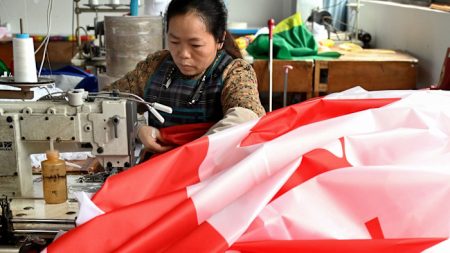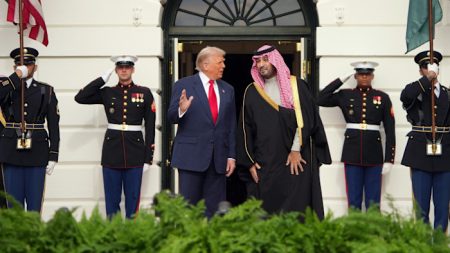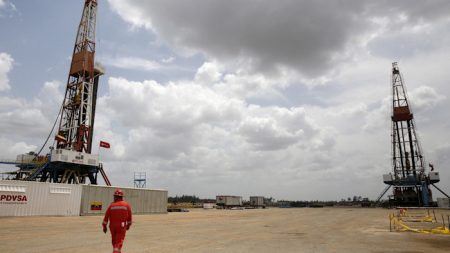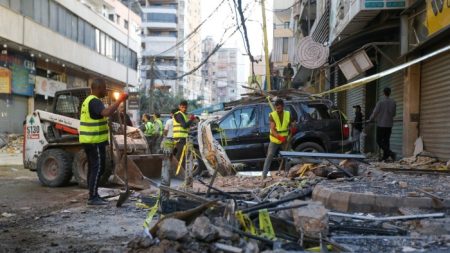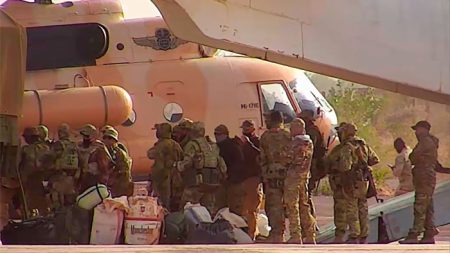Unlock the Editor’s Digest for free
Roula Khalaf, Editor of the FT, selects her favourite stories in this weekly newsletter.
Israeli air strikes on the northern Syrian province of Aleppo have killed and wounded numerous civilians and military personnel, Syria’s defence ministry has said, heightening fears that escalating tensions across the Middle East could ignite a broader regional conflict.
“The Israeli enemy launched an air attack from the direction of Athriya, south-east of Aleppo, targeting a number of points in the Aleppo countryside,” the ministry said in a statement on Friday, without specifying the number of dead.
An opposition war monitor said the strikes had killed 42 people, mostly Syrian troops. Reuters reported 38 killed, including civilians and military personnel. Hizbollah’s media relations office told the Financial Times that five of the Iran-backed Lebanese militant group’s fighters were among the dead.
If the numbers are accurate, the attack would mark the deadliest Israeli strike in Syria since the outbreak of the war in Gaza between Israel and Hamas following the Palestinian militant group’s assault on Israel on October 7.
The strikes are the latest escalation in regional hostilities that have intensified since the start of the conflict in Gaza.
Israeli forces have conducted scores of air strikes against Iran-affiliated forces as part of an increasingly overt confrontation across the Middle East during the past decade. Israel has repeatedly struck targets in Syria, including the Aleppo and Damascus airports, as well as weapons depots tied to Tehran and its proxies in Syria.
Tensions between the two states have increased since October, leading to deadlier strikes and prompting Iran to withdraw some of its senior officers from Syria.
Syria’s state news agency Sana said on Friday that two civilians had also been killed in an Israeli attack on a building in the Damascus countryside on the previous day.
The latest strikes follow another suspected Israeli attack on Syria’s eastern Deir Ezzor province earlier this week, in which local media said at least 15 people were killed.
The US was forced to deny it had carried out the Deir Ezzor strikes after Syrian and Iranian media blamed its forces. Syria’s state news agency said at least one civilian died in the attack, while Iranian state media said an adviser from its elite Revolutionary Guards was also killed.
Meanwhile an Israeli drone strike on Friday in southern Lebanon killed Hizbollah member Ali Naim, the group’s media relations office said. Israel’s military said he was the deputy commander of Hizbollah’s rocket and missiles unit in Lebanon, but Hizbollah disputed that.
The attacks follow Israeli air strikes that killed 16 people in Lebanon on Wednesday night and a barrage of retaliatory rocket fire by Hizbollah militants in which one person in Israel died, in the deadliest day of fighting between Israel and Hizbollah since October.
Israel did not immediately comment on the strikes. It usually neither confirms nor denies accusations that it has carried out assassinations or attacks against Iran or Syria.
Cross-border attacks between Israel and Hizbollah have led to the mass evacuation of civilians on both sides of the Israel-Lebanon frontier and heightened fears of a regional war.
After Hamas’s deadly October 7 assault on southern Israel, officials in the Jewish state have said they will no longer tolerate the presence of Hizbollah forces on the country’s northern border.
Ori Gordin, head of the Israel Defense Forces’ northern command, said this week that Israel was “conducting very significant strikes against Hizbollah” and that it would “continue to be aggressive in order to strike and push Hizbollah back significantly”.
The northern command also conducted a training programme for officers designed to promote “readiness” on the border with Lebanon this week.
Hizbollah and Iranian officials have repeatedly said they do not want a war. Israeli officials also say they would prefer a diplomatic solution.
The US has been leading efforts aimed at brokering a deal to de-escalate the situation. White House National Security Council spokesperson John Kirby told reporters on Thursday: “We’ve also been very, very clear: we do not support a war in Lebanon.”
The UN’s peacekeeping forces in Lebanon have expressed concern about the violence and said the organisation was “ready to support that process in any way we can, including by convening a tripartite meeting at the parties’ request”.
Additional reporting by Bita Ghaffari in Tehran and Guy Chazan and James Shotter in Jerusalem
Read the full article here





